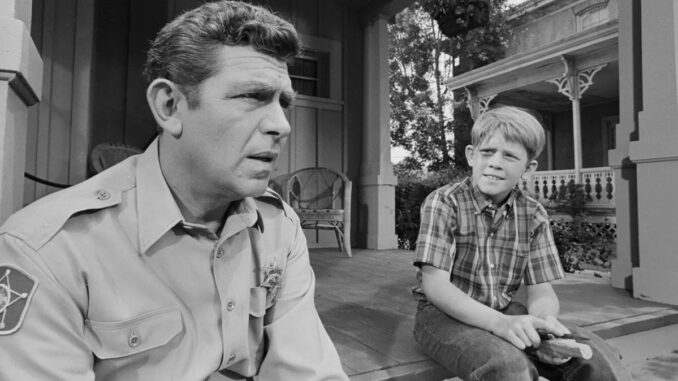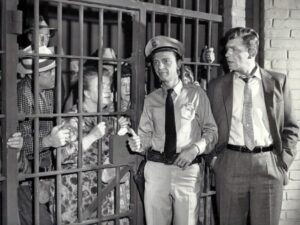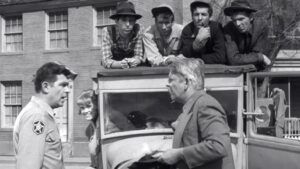
“The Andy Griffith Show” offered a slice of small-town life, capturing the peacefulness of fictional Mayberry—a place so idyllic that it seemed untouched by the chaos of the 1960s. At a time when assassinations, wars, and the civil rights movement were shaking America, this timeless show remained a sanctuary. But why did it stay so unaltered? How did “The Andy Griffith Show” maintain its charm and simplicity, unbothered by the nation’s upheaval? Let’s dive into the reasons why this classic TV show remained a source of comfort and familiarity during one of the most turbulent eras in U.S. history.
The Untouched Allure of Mayberry
Despite the chaos of the 1960s, “The Andy Griffith Show” preserved an untouched setting that became an escape for millions. Mayberry embodied a place where time stood still, unaffected by national and global strife. This idyllic setup allowed viewers to momentarily forget about the challenges outside their door.

A Simple Life: Why Mayberry Avoided Controversy
In the real world, Americans were dealing with serious issues. Yet in Mayberry, life was simple, calm, and endearingly old-fashioned. The show’s creators deliberately chose not to tackle hot-button issues, instead focusing on light-hearted, relatable stories. For audiences, this offered a relief—an escape to a place untouched by controversy.
The Role of Andy Taylor as a Stable Figure
Andy Taylor, played by Andy Griffith, was the rock of Mayberry. As a calm, wise sheriff, he represented stability when many viewers felt the world around them was spinning out of control. His character never exhibited anger or bitterness but rather a quiet understanding, often handling issues with patience and common sense.
Avoiding Political Distractions
While many shows eventually reflected or commented on the times, “The Andy Griffith Show” stayed purposefully neutral. It refrained from making statements on the political issues of the day, including the civil rights movement and the Vietnam War. This decision made the show a safe zone, where viewers could escape from daily turmoil without reminders of divisive topics.
The Timeless Values of Community and Kindness
A large part of “The Andy Griffith Show’s” appeal was its consistent focus on universal values. It emphasized themes like kindness, community support, and honesty—principles that resonate regardless of one’s political views or the current social climate. The show offered gentle life lessons that were easy to relate to and timeless in their nature.
Escaping the Turmoil of the 1960s
The show aired from 1960 to 1968, a period filled with significant historical events. Yet, Mayberry never seemed impacted by these events. When viewers tuned in, they were greeted with the same familiar scenes: Floyd the barber’s shop, the town’s diner, and Andy’s porch. This predictability was comforting, offering a break from a world that felt increasingly unpredictable.
The Art of Nostalgia and Familiarity
One reason “The Andy Griffith Show” stood out was its use of nostalgia. It gave audiences a look back at simpler times, when life wasn’t rushed or overly complicated. By showcasing the warmth and charm of small-town life, the show built a world that felt familiar and timeless—a deliberate choice that only strengthened its nostalgic appeal.
Why The Show’s Simplicity Worked So Well
While many shows adopted complicated plots and flashy gimmicks to attract viewers, “The Andy Griffith Show” stayed simple. Its basic storylines and slow pace allowed for characters to shine. Rather than showcasing conflict, it highlighted everyday situations—raising a son, handling misunderstandings, or teaching a moral lesson. This simplicity added to its enduring appeal.

Mayberry as a Refuge from the Real World
For viewers, Mayberry was more than a fictional town; it was a mental escape from the worries of daily life. As violence and division marked the real world, people found solace in a place where community still mattered and neighbors helped each other. Watching Sheriff Taylor resolve issues without judgment felt comforting, almost therapeutic.
Why the Show Remained Apolitical
In an era of social change, it might seem surprising that “The Andy Griffith Show” remained apolitical. This wasn’t by accident. Show creators knew that taking a stand on controversial topics could alienate viewers. By avoiding political commentary, the show attracted audiences across different backgrounds and beliefs.
A Cast That Defined Family-Friendly Television
The cast, including Don Knotts as Deputy Barney Fife, brought a warmth and humor that made the show feel like home. Each character added to the sense of community, from Aunt Bee’s nurturing presence to Opie’s innocence. This family-friendly vibe made the show suitable for viewers of all ages, further cementing its lasting appeal.
Why Modern Audiences Still Love the Show
Decades after it went off-air, “The Andy Griffith Show” continues to attract new viewers. Its timeless themes and relatable humor allow modern audiences to enjoy it just as much as those who watched in the 1960s. The idea of a place untouched by modern problems still resonates, creating a sense of nostalgia even for those who didn’t live through that era.
The Influence of Andy Griffith’s Vision
Andy Griffith played a significant role in shaping the show’s unique tone. He wanted a light-hearted atmosphere, avoiding unnecessary conflict and dark humor. This vision helped keep the show uplifting, and as a result, “The Andy Griffith Show” became an oasis of calm during unsettling times.
How Mayberry Became a Cultural Icon
The characters and settings of Mayberry quickly became cultural icons. References to Mayberry and its quirky residents still appear in pop culture, representing a simpler, more innocent time. This legacy speaks to the show’s impact on American television and its continued place in pop culture.
The Show’s Impact on Television History
“The Andy Griffith Show” redefined what a successful television series could be. By staying consistently light-hearted and refusing to address divisive topics, it offered a blueprint for other shows seeking mass appeal. This formula became especially valuable for TV shows that followed, proving that simplicity and universal values have lasting appeal.
Conclusion
In the face of turbulent historical events, “The Andy Griffith Show” offered something rare—a peaceful, unchanging escape. Its focus on humor, community, and kindness created a timeless appeal that allowed it to thrive. For many, Mayberry wasn’t just a fictional town; it was a symbol of stability, a comforting retreat from a rapidly changing world. Decades later, the legacy of “The Andy Griffith Show” lives on, reminding audiences of a place where life was just a little bit simpler.
FAQs
1. Why did ‘The Andy Griffith Show’ avoid political topics?
- The show’s creators wanted it to be a universal escape, appealing to audiences across backgrounds by focusing on timeless values instead of current events.
2. How did ‘The Andy Griffith Show’ stay relevant during social upheaval?
- By sticking to simple, relatable stories and avoiding divisive issues, the show became a comforting constant for viewers amid changing times.
3. Why do modern audiences still watch ‘The Andy Griffith Show’?
- The show’s emphasis on kindness, humor, and simplicity resonates with viewers seeking a break from the complexities of modern life.
4. Did ‘The Andy Griffith Show’ reflect the social issues of the 1960s?
- No, the show deliberately avoided social and political topics, focusing instead on universal themes that allowed it to stay neutral and widely appealing.
5. What makes ‘The Andy Griffith Show’ timeless?
- Its emphasis on community, family-friendly humor, and the relatable struggles of small-town life create a timeless appeal that transcends generations.